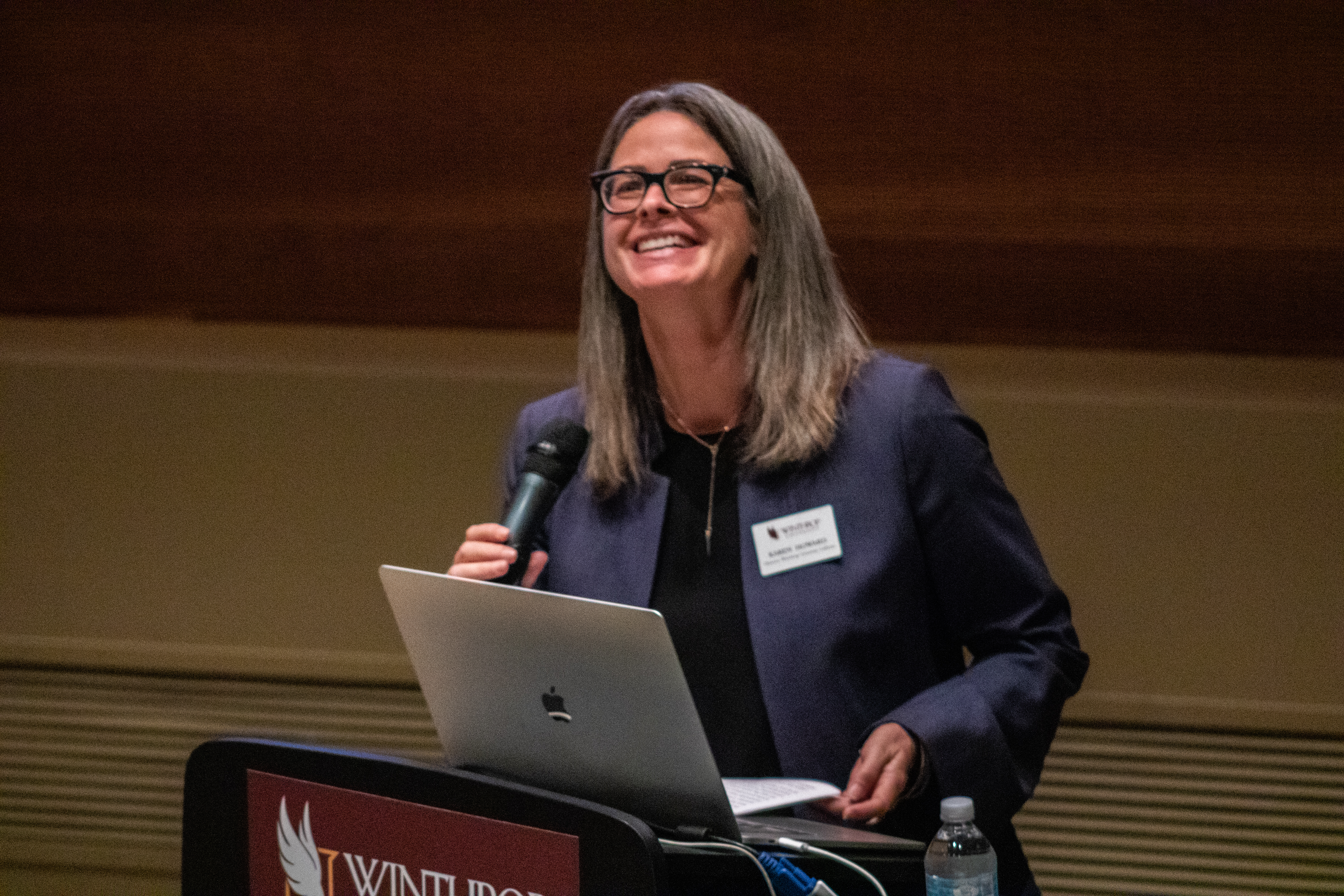Community engagement in the face of divisive rhetoric can come from sources as simple as a conversation over a cup of coffee. This concept is the basis for The Democratic Cup, a nationally known “slow activism” project currently on exhibit in the Rutledge Gallery. The exhibit features handmade mugs representing various social issues to encourage community conversation and engagement. It also features photographs and audio recordings showcasing community engagement throughout the course of the project. The exhibition is accompanied by a series of events and “coffee talks”, which kicked off on Sept. 19 with “Artivism in Action: Where to Begin,” a panel discussion in Dina’s Place.
The project was created by ceramicist Ayumi Horie and designer Nick Moen in collaboration with 50 potters and illustrators from around the country; it explores how art can create awareness and community engagement by inspiring meaningful, civil conversations. The panel event featured Horie and Moen as well as Ursula Hargens, a local organizer for The Democratic Cup in Minnesota and co-founder of Minnesota New Institute for Ceramic Education, and was moderated by Winthrop art history professor Karen Stock.
Horie and Moen created the project during the 2016 presidential election, in response to the “disturbing” language and rhetoric surrounding it. They decided to focus on fostering civility and mutual respect in a simple, straightforward way. As Horie says, “There’s something that happens over a cup of coffee. Something very basic.”
The mugs are designed and created using digital technology as well as by hand, with many illustrators and potters collaborating remotely. The porcelain is also created from scratch using mud from the mountains of North Carolina. The mugs reflect issues that the creators feel strongly about, such as corporate “dark money,” voting, gerrymandering and vaccinations. One cup featured Lady Liberty kissing Lady Justice, while another showed the faces of victims of police brutality accompanied by the phrase, “What did I do? What did I do? Be born black.” Some mugs have un-glazed sections that people can write on.
Moen discussed the project’s focus on the meaning of objects, and the intimate nature of handmade things. In addition to featuring in exhibitions, the mugs are also created to be sold and shipped throughout the United States and beyond. Those who purchase the mugs are encouraged to interact with the organization on social media by sending photos and videos of their own “coffee talks,” or the ways they interact with the mugs themselves.
Horie believes that there is often a perception of craft as separate from fine art, but can be important and communicative when combined. “It doesn’t have to be framed on the wall to be important and make an impact.” Horie says.
The Democratic Cup holds moderated discussions, such as Hargens’ event in Minnesota, titled “In Service: Engaging and Connecting Through Clay.” The event brought the anxiety and fear that people feel about engaging in these discussions to light, particularly the anxiety about talking with friends, family and neighbors about controversial issues that are easier to simply ignore. Hargens says it is best to approach these discussions from a very basic level, that “everyone wants to be safe and connected,” and people can connect over this common ground. The organizers have also created a “toolkit” with instructions for moderating such discussions.
While most of the artists and organizers of The Democratic Cup have liberal views, the organizers are considering what it would mean to create a conservative-leaning cup. While they would risk alienating some members of their community, the organizers believe it may be their duty to show these diverse views and could lessen the anxiety of conservative and Republican individuals who are often afraid to engage in The Democratic Cup events.
In Rock Hill, as with all places, the organizers of The Democratic Cup hope to inspire people to ask, “What are the issues happening here?” as well as to “empower people to become facilitators.” Moen believes that a university campus is the perfect place to foster these discussions, as college students come from many different places and backgrounds and interact with students and faculty with more diverse values than they’ve experienced before.
While change takes time, The Democratic Cup urges small yet impactful engagement that can create significant change over time. The slow nature of change is also reflected in the slow process of creating mugs. As Moen says, “Conversations don’t happen overnight, and it takes a long time to make cups, too!”
The Democratic Cup exhibition will be on display in Rutledge through Nov. 15. The next “Beyond the Gallery Walls” event will be “Coffee Talk – A Steaming Cup of Civil Dialogue” on Oct. 1 from 7 to 9 p.m.. in Rutledge Gallery. It is a free cultural event with limited space, so students must RSVP at https://tinyurl.com/wugcoffeetalk. For more information, visit https://www.winthrop.edu/galleries/educational-programs.aspx
Photo: Olivia Esselman/ The Johnsonian




